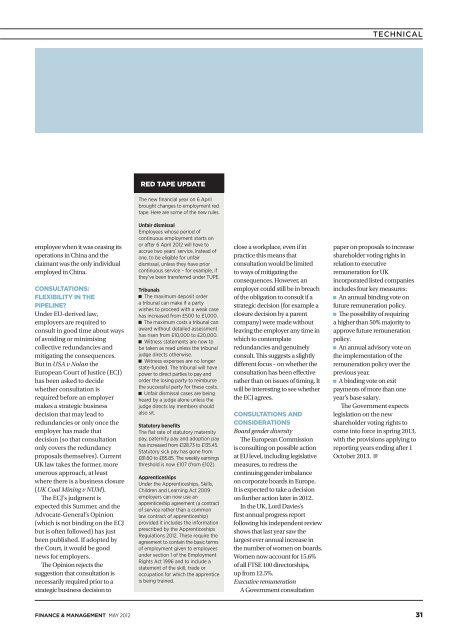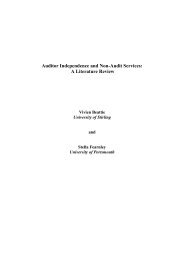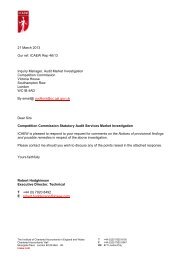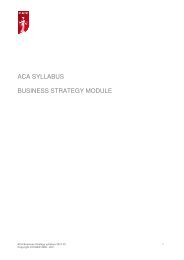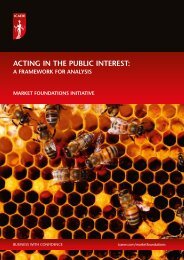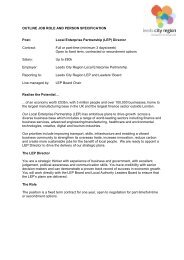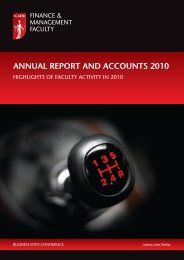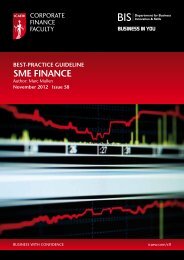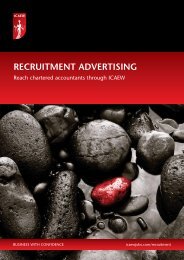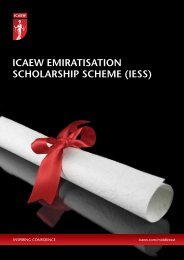Hit the road Positive leadership for troubled times - ICAEW
Hit the road Positive leadership for troubled times - ICAEW
Hit the road Positive leadership for troubled times - ICAEW
Create successful ePaper yourself
Turn your PDF publications into a flip-book with our unique Google optimized e-Paper software.
TECHNICAL<br />
RED TAPE UPDATE<br />
The new financial year on 6 April<br />
brought changes to employment red<br />
tape. Here are some of <strong>the</strong> new rules.<br />
employee when it was ceasing its<br />
operations in China and <strong>the</strong><br />
claimant was <strong>the</strong> only individual<br />
employed in China.<br />
CONSULTATIONS:<br />
FLEXIBILITY IN THE<br />
PIPELINE?<br />
Under EU-derived law,<br />
employers are required to<br />
consult in good time about ways<br />
of avoiding or minimising<br />
collective redundancies and<br />
mitigating <strong>the</strong> consequences.<br />
But in USA v Nolan <strong>the</strong><br />
European Court of Justice (ECJ)<br />
has been asked to decide<br />
whe<strong>the</strong>r consultation is<br />
required be<strong>for</strong>e an employer<br />
makes a strategic business<br />
decision that may lead to<br />
redundancies or only once <strong>the</strong><br />
employer has made that<br />
decision (so that consultation<br />
only covers <strong>the</strong> redundancy<br />
proposals <strong>the</strong>mselves). Current<br />
UK law takes <strong>the</strong> <strong>for</strong>mer, more<br />
onerous approach, at least<br />
where <strong>the</strong>re is a business closure<br />
(UK Coal Mining v NUM).<br />
The ECJ’s judgment is<br />
expected this Summer, and <strong>the</strong><br />
Advocate-General’s Opinion<br />
(which is not binding on <strong>the</strong> ECJ<br />
but is often followed) has just<br />
been published. If adopted by<br />
<strong>the</strong> Court, it would be good<br />
news <strong>for</strong> employers.<br />
The Opinion rejects <strong>the</strong><br />
suggestion that consultation is<br />
necessarily required prior to a<br />
strategic business decision to<br />
Unfair dismissal<br />
Employees whose period of<br />
continuous employment starts on<br />
or after 6 April 2012 will have to<br />
accrue two years’ service, instead of<br />
one, to be eligible <strong>for</strong> unfair<br />
dismissal, unless <strong>the</strong>y have prior<br />
continuous service – <strong>for</strong> example, if<br />
<strong>the</strong>y’ve been transferred under TUPE.<br />
Tribunals<br />
The maximum deposit order<br />
a tribunal can make if a party<br />
wishes to proceed with a weak case<br />
has increased from £500 to £1,000.<br />
The maximum costs a tribunal can<br />
award without detailed assessment<br />
has risen from £10,000 to £20,000.<br />
Witness statements are now to<br />
be taken as read unless <strong>the</strong> tribunal<br />
judge directs o<strong>the</strong>rwise.<br />
Witness expenses are no longer<br />
state-funded. The tribunal will have<br />
power to direct parties to pay and<br />
order <strong>the</strong> losing party to reimburse<br />
<strong>the</strong> successful party <strong>for</strong> <strong>the</strong>se costs.<br />
Unfair dismissal cases are being<br />
heard by a judge alone unless <strong>the</strong><br />
judge directs lay members should<br />
also sit.<br />
Statutory benefits<br />
The flat rate of statutory maternity<br />
pay, paternity pay and adoption pay<br />
has increased from £128.73 to £135.45.<br />
Statutory sick pay has gone from<br />
£81.60 to £85.85. The weekly earnings<br />
threshold is now £107 (from £102).<br />
Apprenticeships<br />
Under <strong>the</strong> Apprenticeships, Skills,<br />
Children and Learning Act 2009<br />
employers can now use an<br />
apprenticeship agreement (a contract<br />
of service ra<strong>the</strong>r than a common<br />
law contract of apprenticeship)<br />
provided it includes <strong>the</strong> in<strong>for</strong>mation<br />
prescribed by <strong>the</strong> Apprenticeships<br />
Regulations 2012. These require <strong>the</strong><br />
agreement to contain <strong>the</strong> basic terms<br />
of employment given to employees<br />
under section 1 of <strong>the</strong> Employment<br />
Rights Act 1996 and to include a<br />
statement of <strong>the</strong> skill, trade or<br />
occupation <strong>for</strong> which <strong>the</strong> apprentice<br />
is being trained.<br />
close a workplace, even if in<br />
practice this means that<br />
consultation would be limited<br />
to ways of mitigating <strong>the</strong><br />
consequences. However, an<br />
employer could still be in breach<br />
of <strong>the</strong> obligation to consult if a<br />
strategic decision (<strong>for</strong> example a<br />
closure decision by a parent<br />
company) were made without<br />
leaving <strong>the</strong> employer any time in<br />
which to contemplate<br />
redundancies and genuinely<br />
consult. This suggests a slightly<br />
different focus – on whe<strong>the</strong>r <strong>the</strong><br />
consultation has been effective<br />
ra<strong>the</strong>r than on issues of timing. It<br />
will be interesting to see whe<strong>the</strong>r<br />
<strong>the</strong> ECJ agrees.<br />
CONSULTATIONS AND<br />
CONSIDERATIONS<br />
Board gender diversity<br />
The European Commission<br />
is consulting on possible action<br />
at EU level, including legislative<br />
measures, to redress <strong>the</strong><br />
continuing gender imbalance<br />
on corporate boards in Europe.<br />
It is expected to take a decision<br />
on fur<strong>the</strong>r action later in 2012.<br />
In <strong>the</strong> UK, Lord Davies’s<br />
first annual progress report<br />
following his independent review<br />
shows that last year saw <strong>the</strong><br />
largest ever annual increase in<br />
<strong>the</strong> number of women on boards.<br />
Women now account <strong>for</strong> 15.6%<br />
of all FTSE 100 directorships,<br />
up from 12.5%.<br />
Executive remuneration<br />
A Government consultation<br />
paper on proposals to increase<br />
shareholder voting rights in<br />
relation to executive<br />
remuneration <strong>for</strong> UK<br />
incorporated listed companies<br />
includes four key measures:<br />
An annual binding vote on<br />
future remuneration policy.<br />
The possibility of requiring<br />
a higher than 50% majority to<br />
approve future remuneration<br />
policy.<br />
An annual advisory vote on<br />
<strong>the</strong> implementation of <strong>the</strong><br />
remuneration policy over <strong>the</strong><br />
previous year.<br />
A binding vote on exit<br />
payments of more than one<br />
year’s base salary.<br />
The Government expects<br />
legislation on <strong>the</strong> new<br />
shareholder voting rights to<br />
come into <strong>for</strong>ce in spring 2013,<br />
with <strong>the</strong> provisions applying to<br />
reporting years ending after 1<br />
October 2013.<br />
FINANCE & MANAGEMENT MAY 2012<br />
31


